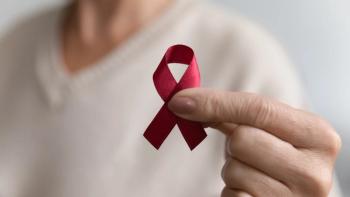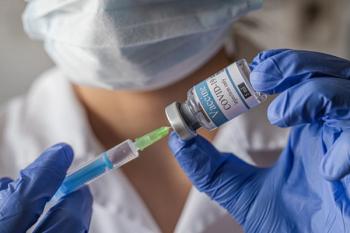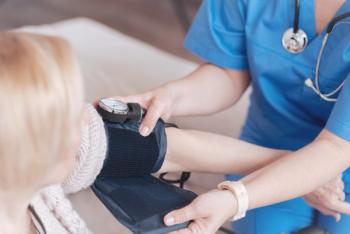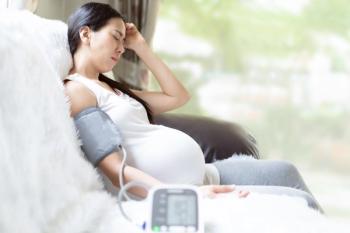
Toby Maurer, MD, professor at University of California, San Francisco, discusses common skin conditions seen in female patients, along with the best methods of treating these conditions.

Toby Maurer, MD, professor at University of California, San Francisco, discusses common skin conditions seen in female patients, along with the best methods of treating these conditions.

Jay Goldberg, MD, ob-gyn at Einstein Medical Center of Philadelphia, discusses treatment paradigms which can help clinicians manage abnormal uterine bleeding in their patients.

A recent study highlights significant disparities in kidney transplant and nephrology care access for pregnant patients with end-stage kidney disease, revealing reduced survival rates and limited access to crucial care compared to non-pregnancy-related causes.

Review some of the top stories from the Contemporary OB/GYN website over the last week, and catch up on anything you may have missed.

A comprehensive meta-analysis scrutinizes the Mediterranean diet's impact on female reproductive health, uncovering compelling evidence that links this nutritional approach to a significant reduction in adverse pregnancy outcomes.

A recent study revealed vaginal progesterone offers no significant reduction in preterm birth risk for twin gestations, prompting reconsideration of its proposed efficacy.

Daré Bioscience's tamoxifen-based therapy, DARE-VVA1, secures FDA clearance for an investigational new drug application, offering hope for women with contraindications to estrogen therapies suffering from the underdiagnosed condition of vulvar and vaginal atrophy.

Findings from a nationwide study in Sweden revealed a reduction in pregnancy weight gain among women with a history of bariatric surgery, underscoring potential clinical implications.

Discover how Mosie Baby's at-home insemination kit, the first FDA-cleared of its kind, empowers individuals facing infertility challenges with an effective, easy-to-use solution for intravaginal insemination.

New research uncovers a connection between infertility and autism spectrum disorder risk, prompting a closer look at perinatal influences and the potential impact of fertility treatments on the developmental trajectory of children.

Daré Bioscience has commenced a pivotal phase 3 clinical trial for ovaprene, an intravaginal contraceptive that releases a locally acting agent to prevent sperm entry into the cervical canal, marking a significant step towards a non-hormonal contraceptive option for women.

Unveiling a comprehensive analysis of menstrual cycle characteristics in mothers and daughters, this article delves into the diverse features, potential risk factors, and the importance of understanding these nuances for effective menstrual health management.

Discoveries from a comprehensive study reveal specific plasma biomarkers that may serve as indicators of neurological well-being in individuals living with HIV, shedding light on potential links to Alzheimer's disease and emphasizing the importance of early detection for improved outcomes.

A study reveals that involving pharmacists in the care of postpartum women at risk of persistently elevated blood pressure, as presented at the American Society of Health-System Pharmacists 2023 Midyear Clinical Meeting and Exhibition, can provide an effective and feasible solution to managing hypertensive disorders, reducing postpartum readmission risks, and improving overall health care access.

A recent study reveals gaps in reproductive health services for women with disabilities, highlighting a 69% likelihood of encountering barriers, including logistical and access challenges.

Review some of the top stories from the Contemporary OB/GYN website over the last week, and catch up on anything you may have missed.

A recent study in Menopause, the journal of The Menopause Society, suggests that a longer reproductive life span and later age at menopause may be associated with a reduced risk of low handgrip strength in postmenopausal women.

A recent study in Microorganisms reveals that Metronidazole treatment failure in bacterial vaginosis is linked to elevated activated T- and dendritic-cell subsets, potentially heightening susceptibility to HIV.

Researchers from the Hospital for Special Surgery (HSS) present new data on various reproductive health issues that affect women with autoimmune rheumatic diseases.

Discover the crucial findings from a recent study investigating vaccine decision-making among Spanish-speaking pregnant individuals, highlighting the pivotal role doctors play in dispelling vaccine hesitancy and fostering acceptance through targeted information dissemination and culturally sensitive approaches.

Researchers from the National Institute on Drug Abuse unveil a 3-fold spike in drug overdose deaths among pregnant women aged 10 to 44 years between 2018 and 2021, highlighting pervasive barriers like discrimination and stigma hindering access to life-saving treatment.

A comprehensive cohort study explored the impact of inactivated COVID-19 vaccines administered within 3 months before conception, revealing reassuring findings that neonatal outcomes, including preterm birth and NICU admission, remain unaffected.

Explore the pivotal role of educational attainment in shaping the complex link between racial and ethnic discrimination and hypertension risk in Black women.

A study found variations in discussions about breast density based on race and ethnicity, leading researchers to urge enhanced cultural competency and shared decision-making to bridge critical gaps in breast density conversations.

A recent retrospective cohort study found that administering antenatal corticosteroids from 34 to 36 weeks of gestation did not decrease composite neonatal respiratory morbidity in twin pregnancies, challenging conventional practices for this high-risk population.

A recent investigation, drawing on extensive Danish registries, uncovers an association between preeclampsia and heightened risks of venous thromboembolism during pregnancy.

A recent comprehensive study reveals that 1 in 5 women in low- and middle-income countries grapple with perinatal anxiety disorders, shedding light on a critical yet often overlooked mental health challenge affecting maternal and infant outcomes in these regions.

A recent study in JAMA Network Open reveals a concerning association between energy drink consumption before pregnancy and heightened risk of gestational hypertension.

Find out more about the potential of RNA biotypes in predicting preeclampsia risk, as a recent study unveils accurate models with 93% to 99% specificity, paving the way for enhanced pregnancy complication prevention and fetal well-being.

Explore the findings of a recent study, revealing that enrollment in the Special Supplemental Nutritional Program for Women, Infants, and Children may influence breastfeeding decisions, shedding light on disparities and suggesting the need for targeted initiatives to enhance breastfeeding rates among low-income mothers.